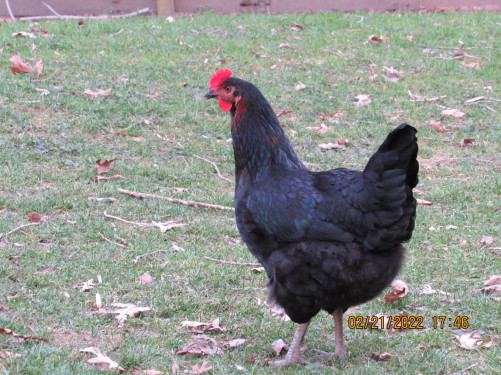Produce
Fresh Farm Eggs For Consumption and Fertilized Eggs, Chicks, Pullets/Cockerels For Your Flocks
.We currently are custodians of and are breeding Bred to Standard Rhode Island Reds, Barred Plymouth Rocks, and our own line of Black Sex Link Hybrids, aptly said to be egg laying machines... RIRxBPR-BSL F1 Hybrids (all large fowl, dual purpose birds that lay Lg/Ex.Lg brown eggs.
We were fortunate to have located and developed a relationship with a well known, local Heritage/Bred to Standard/ SOP breeder of Rhode Island Reds. They were willing to sell us a male and four hens from which we will be developing and then improving our lines. This year we will breed this BtS RIR male with our best Barred Plymouth Rock females giving us an even better Black Sex Link hybrid than the one pictured.. By next spring we are hoping to have developed a relationship with a local breeder of BtS Barred Plymouth Rocks who will be willing to sell us one male and 5-8 females. This will allow us to be self sustainable with both our RIR BtS and BPR BtS lines and to improve our Black Sex Link hybrids even more.
FRESH EGGS FOR CONSUMPTION
If you are seeking quality fresh eggs for consumption, please email or call/text us for information about ordering eggs and picking them up. We have an egg pick up box for your convenience and offer sales of 12, 18 or multiples there of.
FERTILIZED EGGS FOR INCUBATION
For those who wish to begin husbanding chickens or increasing their current flock we will accept orders for fertilized RIR and BSL eggs. As we are incubating and hatching these two types we will also do the same for those who wish not to have to incubate themselves.-
Beginning in late spring 2022, if you are interested in purchasing and hatching some fertilized eggs, we can work out a plan for getting you some eggs in the quantity you need. We will also have chicks and pullets/cockerels. At this time we will only have fertilized eggs and chicks or larger birds available to those who place an order as we do not have the facilities/acreage to hold greater number of animals.
Offerings other than eggs for consumption are done as a service to those who want better quality animals than what the big hatcheries sell.
HARD BOILED FRESH EGGS
iIf you wish to have hard boiled eggs, we suggest the steaming method. We do not boil our eggs (fresh). instead, we steam them in the top of a double boiler steamer for 15 minutes. Start the clock as soon as you put the water in the pot and turn on the heat. Rinse/wash the eggs and place in top part, cover. Get out a larger bowl/pot than the steamer part and fill with water and some ice. After the 15 minutes move the whole steamer section to the ice bath and add more ice. Set timer for 10 minutes. After the 10 minutes take some of the eggs and put them in a plastic container with water half to 3/4 covering the eggs. Cover and shake vigorously but not violently 40 times. Take eggs and rinse off shell bits under running water. Last week I did 14 eggs in the steamer and deshelled 7 at a time. Took all of 2 minutes to have 14 perfect eggs in a container ready to go into a recipe or the fridge. No need for any materials to be added to the water... just steam, ice bath and shake...
LIVESTOCK PREDATORS WE PROTECT AGAINST
Some of you have inquired about the livestock predators we have in our area. Those we have actually seen, have on trail camera, or have seen evidence of (scat/track) are: Coon, Possum, Weasel, Mink, Bobcat, Feral Dog (and dogs off leash), Feral Cat, Coyote, Coy-Dogs (serious broblem in eastern Va.), Black Bear (in Wake Forest and Leesville Rd areas as well as in the Neuse River corridor), Feral Hogs, Red Tailed and Red Shouldered Hawks, Barred Owls (we have yet to see a Great Horned Owl in Wake County) and Bald Eagles. There is also the possibility that a Red Wolf from the population on the Coast goes into a dispersing travel and can reach the Neuse River Corridor. In addition, although pooh poohed by many, the Cougar probably exists in the remote parts of NC in extremely limited numbers. With all these potential predators, there is good reason that you often see the Great Pyrenees (or donkees), one of the better known LGD, on many farms and homesteads. There have been no confirmed sightings of the grey wolf in this area for well over a century.
Local Honey from our own Hives
Currently, our regular Landscape and Irrigation customers are purchasing all of our honey production but we anticipate having more honey and associated products available as the additional hives come into production. We expect to have some product available late summer 2024for new customers.
Our honey is gathered from strong colonies beginning in their second year/summer. We do not feed our bees sugar water which is done in commercial high production operations. (If your honey has sugar crystals forming in it, it is sugar water honey) It is strained. Not filtered, heated nor pasturized. Generally we do not include comb with the honey but some customers have requested it so we can do so as per your request.

